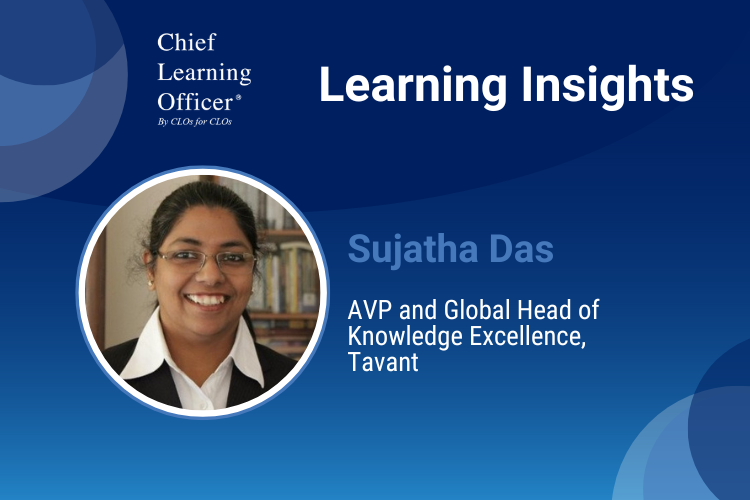Chief Learning Officer’s “Learning Insights” series is dedicated to showcasing the thoughts and career journeys of chief learning officers and learning executives—the tireless trailblazers who are transforming the landscape of corporate learning and workforce development. In this Q&A series, we garner strategic insights, innovative approaches and challenges overcome from visionary leaders worldwide.
CLO: What initially drew you to a career in learning and development, and how have your experiences evolved over the years?
From the very beginning, I was passionate about teaching and the transformative power of education. Starting my career as a faculty member allowed me to witness firsthand the impact of knowledge on individuals’ growth. Leading quality and process improvement teams and initiatives, such as ISO, CMMI and People CMM, provided me with deep insights into developing a function that consistently improves and evolves. These experiences taught me the importance of inclusivity and the power of positive influence, which have become the cornerstones of all my subsequent initiatives, whether in learning, knowledge management or beyond.
Over the years, as I moved from technical training to leadership development, coaching and mentoring, I experienced that learning is the foundation for not just individual success but organizational excellence. My journey has been about continuously evolving, staying curious and seeking out opportunities to create environments where learning thrives. My experiences have shaped my belief that learning is a lifelong journey, and I strive to instill this philosophy in every program I design and every team and organization I lead.
CLO: What key initiatives have you implemented as a learning leader to drive employee development and foster a learning culture?
One of the key initiatives I implemented was the development of a unique blended learning approach that combined traditional learning methods with digital, immersive, experiential, collaborative and peer-to-peer learning, along with various assessments, coaching and mentoring at various stages. This approach allowed our associates to learn at their own pace, collaborate with peers and apply their knowledge in real-world scenarios.
I also championed the creation of a knowledge-sharing platform that encouraged cross-functional collaboration and continuous learning. People were able to share knowledge about concepts as well as implementation experiences across the organization. By aligning these initiatives with the organization’s strategic goals, we were able to foster a culture where learning became an integral part of the workplace, leading to increased people engagement, skill development, overall business success and creating positive impacts with our customers.
CLO: What is the most impactful learning program you’ve introduced in your organization, and how has it contributed to employee growth and business success?
One of the most impactful initiatives I introduced was two Next-Gen Leadership programs. These programs were designed to equip leaders with the skills, knowledge and mindset needed to navigate the complexities of leadership in a dynamic business environment. Through a combination of workshops, masterclasses, coaching and mentoring sessions, psychometric assessments, senior leader interactions and real-life action-learning projects, participants not only developed leadership capabilities but also contributed directly to organizational initiatives. The success of this program was evident in the tangible improvements in team performance, people engagement and customer appreciation. It also enabled us to create a pipeline of leaders who were ready to take on new challenges and drive the organization’s growth.
CLO: What is a common misconception people might have about the L&D function, and how do you address it?
A common misconception is that L&D is simply about training and delivering content. In reality, L&D is a strategic function that aligns closely with business goals to drive performance and innovation. It’s about understanding the needs of the business and its people, designing impactful learning experiences and measuring their effectiveness. I address this misconception by demonstrating the value of L&D through data-driven outcomes, showing how well-designed programs can lead to measurable improvements in people performance, engagement and business results. It’s essential to communicate that L&D is not just a support function but a critical driver of organizational success. I believe curiosity-driven learning is the key to thriving in an ever-changing ecosystem. It empowers us to adapt, grow, and embrace the unknown, turning challenges into opportunities and ensuring we remain resilient and innovative in the face of constant change.
CLO: What excites you the most about the future of workplace learning, and how are you preparing your organization to adapt to the changing landscape?
What excites me most is the potential of technology, particularly AI and data analytics, to personalize and enhance the learning experience. The future of workplace learning will be about delivering just-in-time, relevant content that meets the needs of learners at every stage of their careers. I’m preparing my organization by integrating these technologies into our learning strategies, fostering a culture of continuous learning and ensuring that our programs are agile and adaptable. This includes developing digital literacy among our workforce and leveraging AI to predict learning needs and deliver tailored learning experiences that keep pace with industry changes.
CLO: What essential qualities or skills make a successful L&D leader, and how do you cultivate these traits in yourself and among your team?
A successful L&D leader must be strategic, empathetic and innovative. They need to have a deep understanding of both the business and the people they serve. Cultivating these traits involves continuous self-reflection, seeking feedback and staying informed about industry trends. For myself and my team, I emphasize the importance of lifelong learning, encouraging curiosity and creating a safe space for experimentation and innovation. We regularly engage in professional development opportunities, share insights and collaborate on new ideas to ensure that we are not only keeping pace with the changing landscape but also leading the way.
CLO: What game-changing advice would you offer if you could go back in time and mentor your younger self?
I would tell my younger self to embrace every learning opportunity, even those that seem outside of your comfort zone. The key to long-term success is adaptability and a willingness to evolve. Don’t be afraid to take risks, ask questions and seek out mentors who can guide you along the way. Most importantly, remember that leadership is not just about leading others, but also about leading yourself—understanding your values, strengths and areas for growth. Cultivate resilience, be patient with your progress and always stay curious. Continuously engage with industry experts and practitioners to explore and learn about diverse approaches that can be implemented.
CLO: What do you feel is currently the single biggest challenge facing L&D professionals and the industry as a whole?
The biggest challenge facing L&D professionals today is keeping up with the rapid pace of change while ensuring that learning remains relevant and impactful. With the constant evolution of technology, business models and workforce expectations, L&D must continuously adapt to meet these new demands. This requires agility, a deep understanding of emerging trends and the ability to design learning experiences that are both scalable and personalized. Addressing this challenge involves not only staying ahead of the curve in terms of skills and knowledge but also fostering a culture of continuous learning within the organization.
CLO: We’re always looking to showcase innovative tools and technologies. Can you share one work or learning tech product or platform that has significantly improved your work processes and why you find it valuable?
I would recommend two platforms that we are leveraging: Adobe Learning Manager as a learning experience platform, and O’Reilly, which provides access to a vast library of technical and business content. It includes books, videos, live online training, interactive learning experiences and many other features across a wide range of topics, including software development, data science, AI, business management and more. These have significantly improved our work processes by leveraging AI to personalize learning for each individual.
While the O’Reilly platform allows us to curate and recommend content based on each associate’s role, skills and career aspirations, Adobe Learning Manager facilitates all learning initiatives including social learning. These platforms enable our associates to share knowledge, collaborate on projects and learn from each other in real-time. The use of data analytics within the platforms provides insights into learning patterns and effectiveness, allowing us to continuously refine and improve our programs. These technologies have been invaluable in creating a more engaged and empowered workforce.
Interested in being featured in our “Learning Insights” series? Please complete this FORM.















